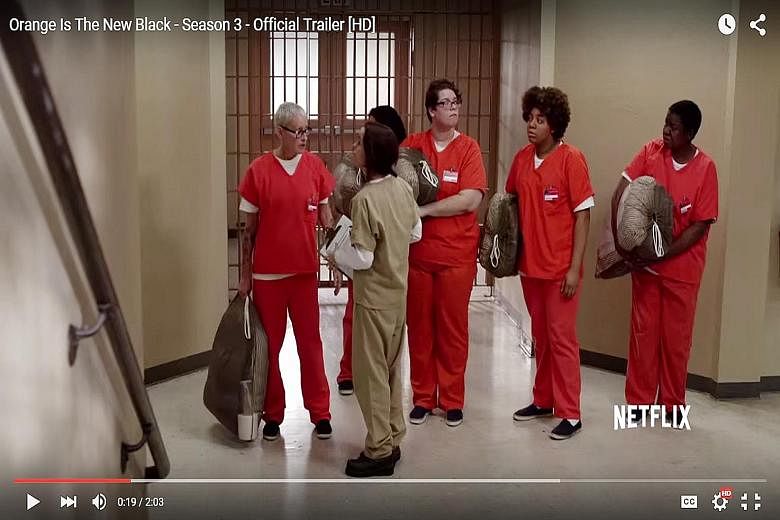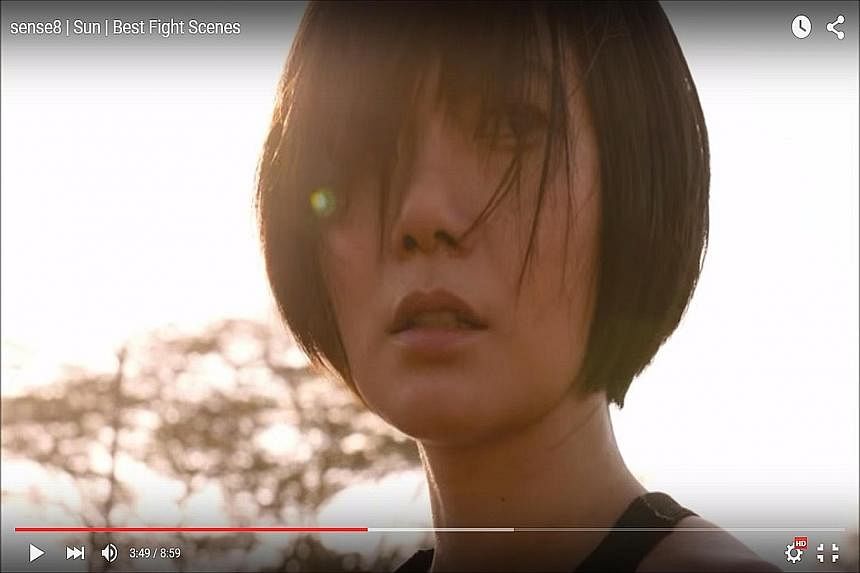As well as changing how viewers watch television, the on-demand video-streaming site Netflix - which is eyeing Singapore as a market - has produced some of the most ambitious and diversity- friendly dramas on American TV.
These include its flagship series Orange Is The New Black, a prison tragicomedy up for Outstanding Drama and three other gongs at the Emmys on Sept 20, and Sense8,
a globetrotting science-fiction fantasy that debuted on the subscription service a few months ago.
After three seasons, Orange Is The New Black is still one of the best things on TV, its look at life in a women's prison a masterclass in dark, insightful comedy.
Season 1 begins with a young woman named Piper (Taylor Schilling) being sent to jail after taking the fall for her drug-smuggling girlfriend Alex (Laura Prepon).
-
ORANGE IS THE NEW BLACK
Seasons 1 to 3
Netflix
4.5/5 STARS -
SENSE8
Season 1
Netflix
3.5/5 STARS
White, middle-class and naive, she sticks out like a sore thumb in the largely working-class and minority population of Litchfield Penitentiary.
As she adjusts to her surroundings, the show begins sketching finely observed portraits of the inmates and guards, with flashbacks providing the backstory to how each person ended up where she is.
The show has a large ensemble cast with at least 15 main characters, but it takes its time to add depth and detail, putting to good use the unique opportunity for long-form storytelling afforded by platforms such as Netflix, which releases all episodes of a season at once.
The result is some of the most compellingly complex characters on TV: the unstable-yet- entertaining Crazy Eyes (played by Uzo Aduba in an Emmy-winning performance); Red, the stoic Russian matriarch in charge of the all-important kitchen detail; John (Matt McGorry), the guard who falls in love with and impregnates an inmate, Daya (Dascha Polanco); and Sophia (Laverne Cox), the transgender inmate who has to deal with the prison cutting off her supply of hormones.
In addition to being an indictment of the prison system, the intricacies of Litchfield politics often serve as a microcosm of society, with the warring factions grouped by race, class, sexual orientation and religion, but with none of the usual lazy stereotypes.
The guards and administrators are fully realised characters, too.
All struggle against a system and bureaucracy that seems designed to dehumanise and diminish them.
When they succeed - whether it is with a clandestine drug-running scheme or a much smaller triumph, like a decent haircut or meal - it is impossible not to rejoice.
It is a credit to both the showrunners and Netflix that their casting choices reflect true diversity - not just in terms of race and age but, refreshingly, in body type too. Apart from the Hollywood-pretty Schilling and Prepon - who become less of the focus as the show progresses - all the inmates look like real women.
The same cannot be said of Sense8, where the actors are all classically telegenic.
However, here as well, there has been a concerted attempt to deviate from the usual Hollywood narratives, especially those focused on white, American, heterosexual and cisgender stories.
Written and produced by Andy and Lana Wachowski, the duo behind The Matrix films (1999-2003), the series follows eight strangers from different parts of the world who find their senses suddenly and psychically intertwined: They are able to see, feel and understand what others in the group experience, even if they are on the other side of the globe.
There is Kala (Tina Desai), a nervous young bride in Mumbai; Sun (Bae Doona), a kickboxing star in South Korea; Wolfgang (Max Riemelt), a safe-cracker in Berlin; Lito (Miguel Angel Silvestre), a closeted gay soap opera actor in Mexico City; Capheus (Aml Ameen), a bus driver in Nairobi; Nomi Marks (Jamie Clayton), a transgender hacktivist in San Francisco; Riley (Tuppence Middleton), a deejay in London and Reykjavik; and Will (Brian J. Smith), a Chicago police officer.
They soon learn that they belong to a special breed known as "sensates'' - and that they are being hunted by an organisation bent on killing, lobotomising or otherwise neutralising them because it believes they are a threat to the world's governments.
The mechanics of and mythology behind their powers is a bit muddled and feel more like fantasy than proper science-fiction.
However, it is justification enough for some nifty scenes of people discovering their new powers - just like in any superhero story.
Thus Capheus gets to use Sun's kickboxing moves to defeat a gang of thugs, Nomi borrows Wolfgang's lock-picking skills to wriggle out of a pair of handcuffs, while Will deploys Nomi's hacking know-how to find some crucial information.
As enjoyable as these interludes initially are, the plot becomes increasingly convoluted and far-fetched.
If the Wachowskis had not been quite so married to the "8" in the title of their show, they could have had fewer protagonists and a more streamlined tale. Indeed, the series does best when it takes the time to focus on individual stories, some of which are much better written than the others.
Yet there is much to admire here, especially in the Wachowskis' willingness to explore alternative narratives and cultures - the luscious location shoots alone make it worth it and the scope of the production is impressive.
While the tone is often cloyingly sentimental, with the New Age-y subtext that human beings are all interconnected somehow, there are worse things a TV show can do than ask you to imagine yourself in another person's shoes.



